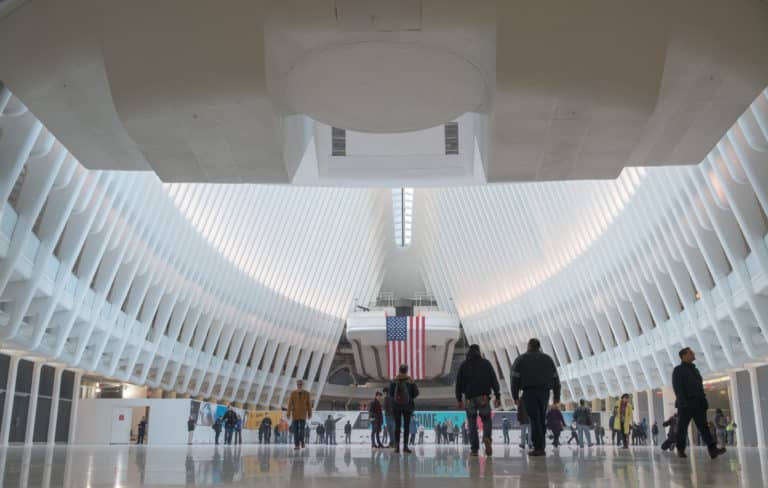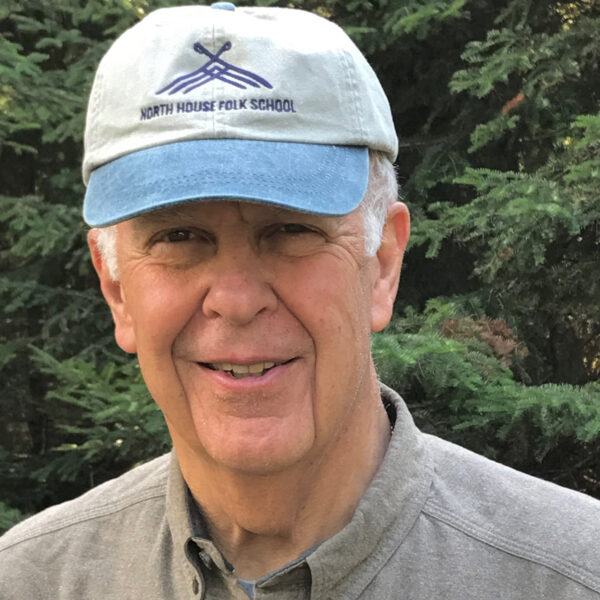
Image by Paul McGeiver/Flickr, Some Rights Reserved.
What We Need Is Here
The Wild Geese
by Wendell BerryHorseback on Sunday morning,
harvest over, we taste persimmon
and wild grape, sharp sweet
of summer’s end. In time’s maze
over fall fields, we name names
that went west from here, names
that rest on graves …(Excerpted from The Selected Poems of Wendell Berry. Read the full poem here.)
In 1975, my wife, our three children and I moved to Pendle Hill, a Quaker community of some seventy people near Philadelphia. Founded in 1930, and still going strong, Pendle Hill’s cash crop is residential adult education done amid a daily round of communal life — shared meals, physical work, study, social action, silent meeting for worship, watching out for each other, and laughter, lots of laughter.
I lived and worked at Pendle Hill for ten years, slowly learning that Wendell Berry is right. What we need is here, if we can learn to trust and draw upon the abundance within us and between us. That was a principle worth knowing in a Quaker community where we didn’t have a lot of money to buy external solutions our problems, but we had each other. It’s a principle we need to know in these troubled times, as many embrace the fear-ridden fiction that “what we need is gone.”
Scarcity need not be the law of life — not if we know how to tap into the endless resources of self and community. If you already understand that simple truth, may you and your tribe increase! It took a profound challenge to my sense of self and world to teach me about the abundance within my reach.
In 1975, with a Ph.D. from Berkeley in hand and eight years of work experience, I became Pendle Hill’s Dean of Studies. Despite my “superior” qualifications and the “special demands” of my job, I received the same base salary as everyone else on staff, including the recent high school graduate who worked in the kitchen: room and board plus ,400 a year (about ,000 today) with modest annual cost-of-living adjustments.
Equality wasn’t a pious platitude at Pendle Hill; it was an economic reality. Communalism isn’t for everyone, and it’s not the only way to learn that “what we need is here,” but it was what I needed to open my eyes to a secret hidden in plain sight, one that had eluded me on my way up the status ladder.
With no false monetary markers of who’s important and who’s not, the abundance within us and between us became clearer and more accessible to me. On a level economic playing field, it was easier to see that everyone is important, everyone has a story worthy of respect, everyone has insights from which we can learn, and everyone has gifts to contribute to the common good.
James, a member of the Pendle Hill community, had trouble grasping abstract principles when we were exploring the Quaker approach to education. But when a furnace broke down in mid-winter, forcing people to wear parkas in their rooms, James knew how to fix it.
Another member, Cynthia, needed supervision in the garden, lest she uproot vegetable seedlings in the belief that they were weeds. But if you were grieving a profound loss, Cynthia could help you find the kind of consolation that comes only when you feel deeply heard.
Nancy and Bill, also Pendle Hill residents, felt called to witness against a racist measure the city council was considering — two quiet voices of conscience in a town where the measure had widespread support. But after discussing their conviction with their Pendle Hill cohorts, they were able to attend the hearing with 50 like-minded citizens to amplify their voices.

A decade of experiences like these left me with no doubt that what we need is within us and between us, in the human heart and in various forms of life together. Whether the problem is mechanical, spiritual, or political, “what we need is here” more often than we think.
Back in the so-called real world — which is often bizarrely unreal, a thin tissue of commercial and political lies — we’re overly reliant on external fixes to our problems, especially when those problems go beyond the personal. We’re forever playing the “If only…” game: If only we could raise enough money to fund this important project. If only we could find the right expert to solve the problems our city is facing. If only we could amass enough firepower to make our neighborhood safe. If only we could elect more true public servants to political office.
The more often we turn outward for help, the more likely we are to forget what’s close at hand. Yes, there are times when we need resources from “out there” to help solve our big problems. But the odds of finding them increase dramatically when we begin “in here.”
If there’s an objective need for more money to pull off an important project, finding it begins with reaching into our own pockets, coming into community with others who do the same, then extending that community to include outsiders who can help.
If there’s a need for expert advice, let’s first look around our own community to see if it’s available there. If we don’t have a community, let’s look inside ourselves to find and change some of the reasons why that’s the case. The roots of community itself are found within us.
If a neighborhood has become unsafe, neighborhood watch programs based on the principle that “we’re all in this together” have proven effective in reducing crime. Such approaches — combined with well-staffed community policing programs — are more effective and safer by far than when everyone straps on a handgun.
If we want nobler people elected to office, let’s remember how often we end up with carbon copies of our own shadows — leaders who represent projections of the electorate’s prejudices and fears. Then let’s work with ourselves and others to practice “a politics worthy of the human spirit.”
Every year, billions of dollars are spent trying to persuade us that we are resource-poor. Why? Because there’s money to be made by convincing us that what we need is owned and sold by someone else. In this culture of commercialism, it’s hard to wrap our minds around the notion that “what we need is here.” It’s even harder to trust it enough to act upon it.
When I lose faith in the abundance among us, I re-read “The Wild Geese,” paying special attention to its closing lines. As I do, I think back on the fact that each day at Pendle Hill began with an hour of shared silence to help us recall and reclaim the gifts tucked away deep in ourselves and our relationships.
As Wendell Berry says, we don’t need to wait for a “new earth or heaven” in order to live by the truth that what we need is here. All we need is “to be quiet in heart, and in eye, clear.” Then we will see and gain access to the resources within and between us, the amazing abundance of self and community.

